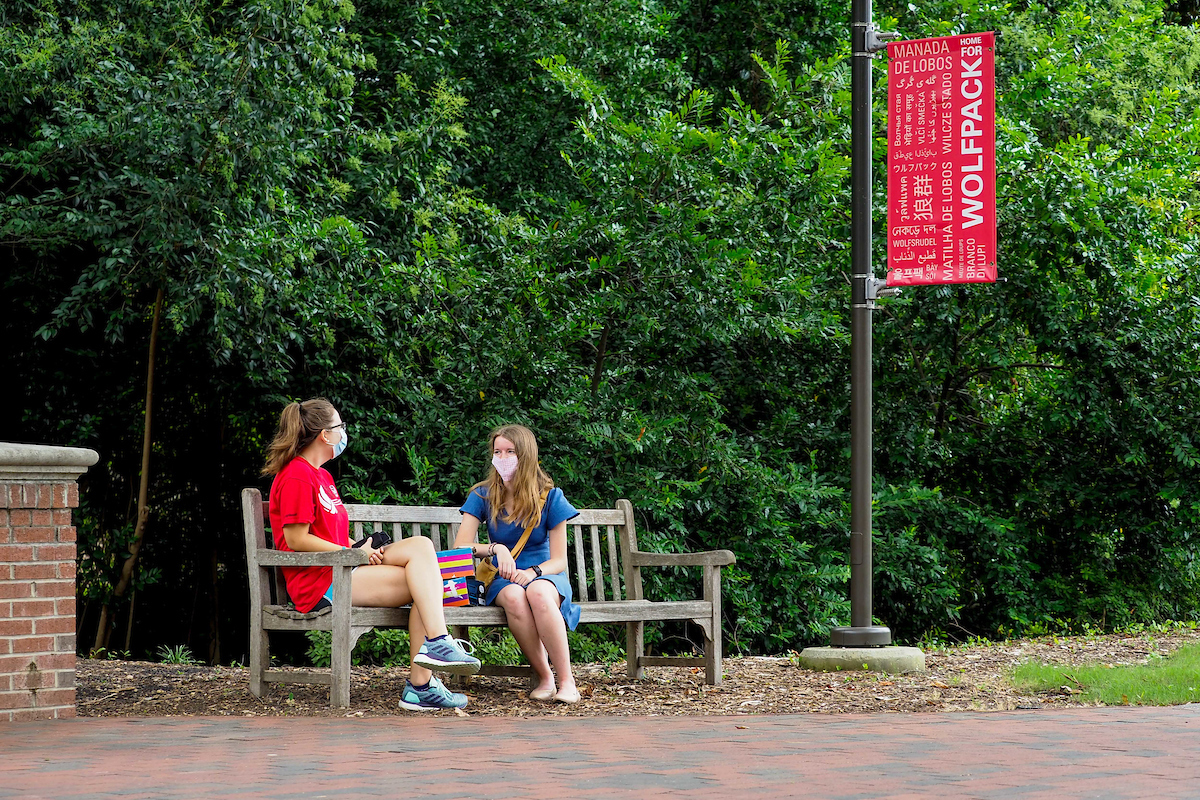Fall 2020 First Term Survey Highlights
Context for Fall 2020
As a result of the COVID-19 pandemic, in fall 2020 all undergraduate courses were moved to an online format. Approximately 28% of all undergraduate course sections were asynchronous while 72% of course sections met synchronously.1 Undergraduate students were instructed to move out of University Housing, although some exemptions were granted. Many first-year and transfer students returned to their permanent residence or moved to off-campus housing. Students received an invitation to participate in the First Term Survey 8 weeks into the semester, after students were moved off-campus and classes were moved online. 1,367 first-year and 427 transfer students participated in the survey.2 Partial survey results are provided below and the full reports are available at go.ncsu.edu/first-term.

Academic Virtual Engagement
First-year and transfer survey respondents reported issues connecting with their courses and instructors and difficulty managing their time. However, respondents reported that their courses provided them with valuable learning.
Students reported that technological and connectivity issues disrupted their ability to complete their academic work during the fall 2020 semester (e.g., participate in class, complete assignments).
Next Steps for DASA
DASA faculty and staff can take action from these findings by orienting new students to online platforms and providing clear guidance on the roles of various systems (WebAssign, Moodle, etc.) that may help students navigate courses and locate assignments. Students may require additional flexibility in the online environment. Recorded lectures may allow students to engage with course content when live streaming can be difficult.
DELTA provides suggestions for increasing course flexibility for spring 2021 on their website: https://delta.ncsu.edu/news/2020/11/30/delta-faculty-fellows-share-ways-to-plan-breaks-for-students-this-spring/
In fall 2020, a higher percentage of first-term and transfer students reported difficulty managing their time and a lack of a connection to faculty than in fall 2019. The online environment may inhibit students’ abilities to engage with their courses or instructors in many ways.
Next Steps for DASA
DASA faculty and staff can promote opportunities for students to engage with faculty and student success support (such as virtual office hours, tutoring, writing support, library support, etc.) Provide a link to the Academic Success Center in your course Moodle sites and share ASC services, such as academic peer mentoring for time management and study skills support.

Co-curricular Virtual Engagement
First-year and transfer students crave co-curricular and peer engagement. However, many students are not engaging with available services. Quantitative and qualitative survey responses revealed online fatigue and confusion about when events occur. Many first-year and transfer students who participated in co-curricular activities reported positive outcomes. Some also made suggestions that could help increase student connection and engagement with virtual activities.
Next Steps for DASA
DASA faculty and staff are encouraged to add events to the University Calendar to ensure engagement opportunities reach the most students. Within these events, faculty and staff can also incorporate breakout group discussion and interactive elements to help students engage and connect. Students may also engage more when they are able to interact with the same small group peers repeatedly over the course of programming.

Psychological Wellness
The First Term Survey includes several questions geared towards understanding NC State students’ psychological well being mid-way through their first term. These psychological indicators help DASA faculty and staff identify students who may be struggling to transition to NC State. Students who report difficulty making friends, feeling overwhelmed, and problems coping with stress may trigger an “early alert.” CARES staff respond to the alert by reaching out to the student to offer support.
The survey revealed that many of our first term students are overwhelmed; respondents cited academics as their primary source of stress.
Next Steps for DASA
NC State faculty and staff can refer students who may benefit from support to the Counseling Center Self-Help Resources or to make an appointment at counseling.dasa.ncsu.edu. Students who exhibit concerning or worrisome behavior should be referred to CARES at prevention.dasa.ncsu.edu/nc-state-cares.
For complete results and respondent demographics, please visit go.ncsu.edu/first-term.1 Data provided by Enrollment Management Services. 2 The First Term Survey was administered between September 28-October 23, 2020. 4,666 first-year and 1,446 transfer students were invited to participate in the assessment resulting in a 29% and 30% response rate, respectively.